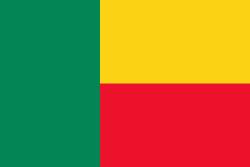Djougou (Commune of Djougou)
Djougou is the largest city in northwestern Benin. It is an important market town. The commune covers an area of 3,966 square kilometres and as of 2002 had a population of 181,895 people.
Djougou is home to a constituent monarchy.
The city of Djougou is the capital city of the department of the Donga, and is considered to be the commercial capital of the Atacora-Donga region, with Natitingou acting as the seat of government and the primary tourist city. Djougou has a population of over 237,000 according to 2009 recensement. While Dendi is the primary language and ethnic group in Djougou, there are also a number of Fulani (Peul in French), Yoruba, Bariba, as well as transplanted Fon from the South. Like most of Benin, Djougou has a young and growing population. Large families and multiple wives are common—leading to a large number of young and school-aged children and pregnant women. There are many different neighborhoods throughout the city, but they are fairly amorphous. People are quicker to identify where they live not by the name of their neighborhood, but by which main road it lies on or by a nearby landmark or mosque.
The population of Djougou is predominantly Muslim, with each neighborhood boasting at least one mosque. Muslims in Djougou range from the very conservative to the fairly liberal. It is relatively common to see women completely veiled in black, including their faces. More often, however, Muslim women wear a headscarf and a few wear no veil of any kind. This wardrobe decision is made by following family tradition until marriage, after which she follows the traditions of her husband's family. Conservative Muslim men refrain from alcohol, but most are not opposed to drinking. Nearly all Muslims abstain from eating pork and observe the calls to prayer. There is a considerable Catholic presence in Djougou as well with a large cathedral, a convent, seminary, and Catholic school system that runs through secondary school. Religion is important to the people of Djougou and it is common to be asked your religious affiliation when meeting someone new. This is done out of curiosity, not prejudice, and there appears to be a considerable amount of religious tolerance here. Christian and Muslim holidays are both celebrated.
Djougou is home to a constituent monarchy.
The city of Djougou is the capital city of the department of the Donga, and is considered to be the commercial capital of the Atacora-Donga region, with Natitingou acting as the seat of government and the primary tourist city. Djougou has a population of over 237,000 according to 2009 recensement. While Dendi is the primary language and ethnic group in Djougou, there are also a number of Fulani (Peul in French), Yoruba, Bariba, as well as transplanted Fon from the South. Like most of Benin, Djougou has a young and growing population. Large families and multiple wives are common—leading to a large number of young and school-aged children and pregnant women. There are many different neighborhoods throughout the city, but they are fairly amorphous. People are quicker to identify where they live not by the name of their neighborhood, but by which main road it lies on or by a nearby landmark or mosque.
The population of Djougou is predominantly Muslim, with each neighborhood boasting at least one mosque. Muslims in Djougou range from the very conservative to the fairly liberal. It is relatively common to see women completely veiled in black, including their faces. More often, however, Muslim women wear a headscarf and a few wear no veil of any kind. This wardrobe decision is made by following family tradition until marriage, after which she follows the traditions of her husband's family. Conservative Muslim men refrain from alcohol, but most are not opposed to drinking. Nearly all Muslims abstain from eating pork and observe the calls to prayer. There is a considerable Catholic presence in Djougou as well with a large cathedral, a convent, seminary, and Catholic school system that runs through secondary school. Religion is important to the people of Djougou and it is common to be asked your religious affiliation when meeting someone new. This is done out of curiosity, not prejudice, and there appears to be a considerable amount of religious tolerance here. Christian and Muslim holidays are both celebrated.
Map - Djougou (Commune of Djougou)
Map
Country - Benin
 |
 |
| Flag of Benin | |
From the 17th to the 19th century, political entities in the area included the Kingdom of Dahomey, the city-state of Porto-Novo, and other states to the north. This region was referred to as the Slave Coast from the early 17th century due to the high number of people who were sold and trafficked during the Atlantic slave trade to the New World. France took over the territory in 1894, incorporating it into French West Africa as French Dahomey. In 1960, Dahomey gained full independence from France. As a sovereign state, Benin has had democratic governments, military coups, and military governments. A self-described Marxist–Leninist state called the People's Republic of Benin existed between 1975 and 1990. In 1991, it was replaced by the multi-party Republic of Benin.
Currency / Language
| ISO | Currency | Symbol | Significant figures |
|---|---|---|---|
| XOF | West African CFA franc | Fr | 0 |
| ISO | Language |
|---|---|
| FR | French language |















